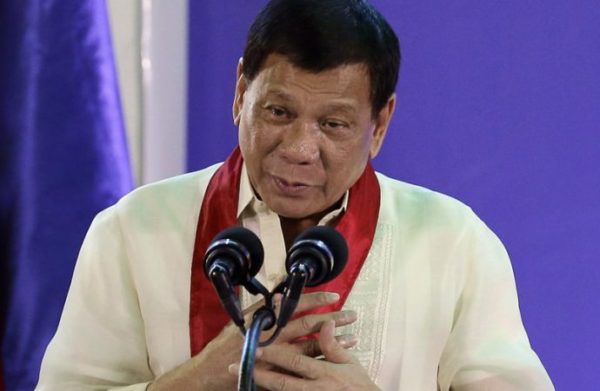Philippine bishops deny trying to undermine Duterte anti-drug crackdown
October 9, 2017 · By Catholic News Service for cruxnow.com

In this Aug. 2, 2017 file photo, Philippine President Rodrigo Duterte speaks in metropolitan Manila. (Credit: Aaron Favila/AP.)
The Catholic Church in the Philippines says it is not trying to destabilize the government by offering sanctuary to security officers wishing to testify about abuses in the country’s violent anti-drug crackdown. Archbishop Socrates Villegas of Lingayen-Dagupan, the bishops’ conference president, earlier announced that police officers wanting to reveal information about the drug war have sought church protection.
MANILA, Philippines – Catholic bishops are not out to undermine the administration of President Rodrigo Duterte by offering sanctuary to several police officers allegedly linked to drug-related killings, an official of the bishops’ conference said.
Father Jerome Secillano, executive secretary of the public affairs office of the Catholic Bishops’ Conference of the Philippines, said church leaders should not be perceived as plotting against anyone.
“The church is not one to take steps to destabilize the institution (government) or to undermine the president,” he told ucanews.com.
He said some law enforcement officers sought the help and protection of the church so they could reveal what they know about drug-related killings.
About 3,500 alleged drug dealers and users have been killed in official police operations since Duterte took office following his election in 2016 while thousands more have died in vigilante killings, The Washington Post has reported.
Justice Secretary Vitaliano Aguirre II accused church leaders of hiding witnesses, hampering the investigations of recent killings, particularly that of three teenagers in the Manila suburb of Caloocan.
Aguirre charged that church leaders have been trying to obstruct investigations by withholding witnesses.
“Why are you intervening? … Aren’t we all in favor of eliminating police scalawags who kill teenagers who are helpless?” he asked.
National Police Chief Ronald dela Rosa also urged the bishops to turn over police officers who reportedly have information about the killings.
“If it’s true, then present these people. There is no problem,” said dela Rosa. “We are talking about testimonies.”
Dela Rosa said he would not stop police officers seeking the help of bishops, but warned of “sanctions” if they go absent from their duties.
Meanwhile, members of the Philippines Senate who are investigating the killings offered protection to the police officers.
Sen. Panfilo Lacson, who chairs the Senate committee on public order and dangerous drugs, appealed to the bishops to allow the police officers to testify in the investigation.
“(The bishops) can bring them to us and we will not shy away from our mandated task to conduct the investigation,” Lacson said.
He added that police officers should issue sworn statements to support their stories.
Sen. Grace Poe, vice chair of the Senate panel, lauded the church for “opening its arms wide to provide sanctuary” to witnesses.
Archbishop Socrates Villegas of Lingayen-Dagupan, bishops’ conference president, earlier announced that police officers wanting to reveal information about the drug war have sought church protection.
“They have expressed their desire to come out in the open about their participation in extrajudicial killings and summary executions,” he said in a statement Oct. 2.
The archbishop declined to say how many police officers were prepared to come forward or if they included two officers who earlier testified at a Senate hearing. He said convents and seminaries in the archdiocese could serve as places of refuge for witnesses and their families after an assessment of the accuracy of their accounts.
Secillano, however, said law enforcers should follow a “process” before they are placed under the church’s protection.
“The initial step is the church will listen to them,” the priest said. “They won’t be rejected right away. The determination of the truthfulness of what they are saying comes next.”






